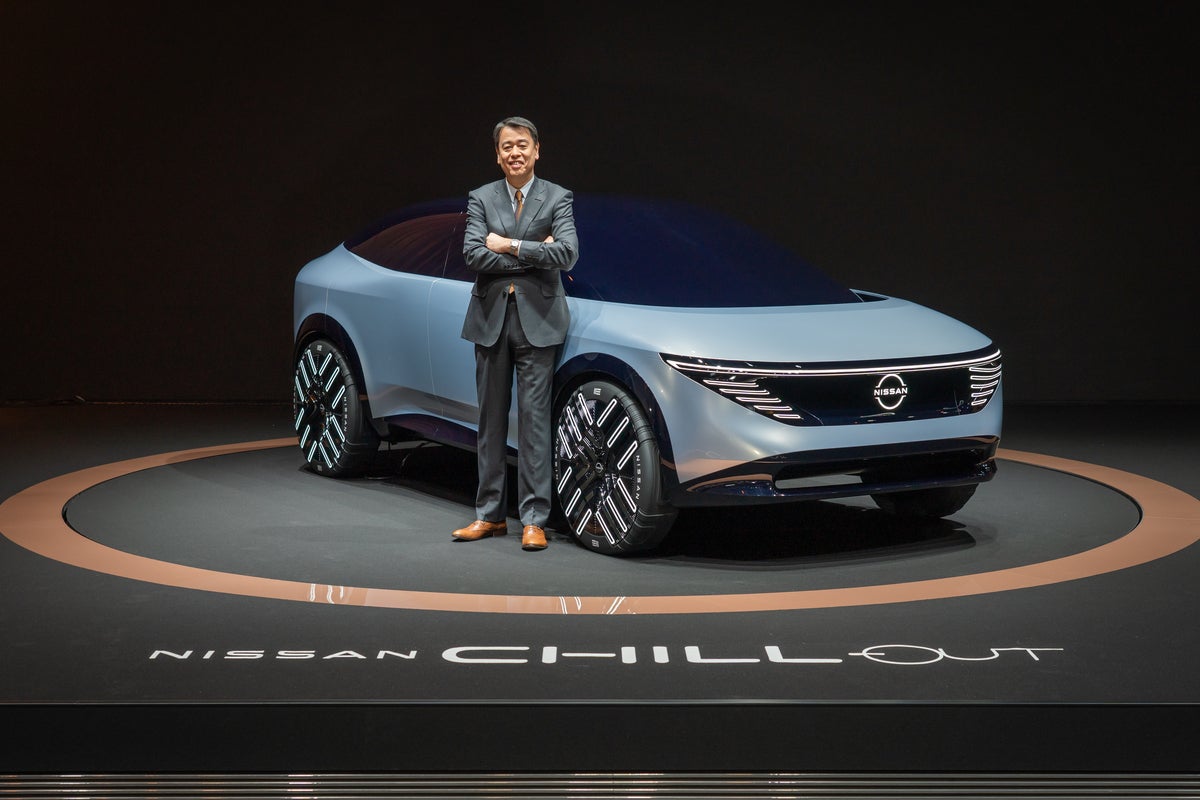
Nissan says it is to accelerate its electrification plans with an investment of 2 trillion yen over the next five years. It has also put a plan in place for solid-state batteries later this decade that it claims will improve EV efficiency and lower costs for cost parity with ICEs.
Under ‘Nissan Ambition 2030’ the company aims to be carbon neutral across the life cycle of its products by fiscal year 2050.

Discover B2B Marketing That Performs
Combine business intelligence and editorial excellence to reach engaged professionals across 36 leading media platforms.
Nissan says the investment will bring the 23 new electrified models, including 15 new EVs by fiscal year 2030 aiming for an electrification mix of more than 50% globally across the Nissan and Infiniti brands.
Nissan CEO Makoto Uchida said: “The role of companies to address societal needs is increasingly heightened. With Nissan Ambition 2030, we will drive the new age of electrification, advance technologies to reduce carbon footprint and pursue new business opportunities. We want to transform Nissan to become a sustainable company that is truly needed by customers and society.”
Nissan intends to increase its electrification sales mix across major markets by fiscal year 2026, including:
- Europe by more than 75% of sales
- Japan by more than 55% of sales
- China by more than 40% of sales
- US by 40% of EV sales in fiscal year 2030
“We are proud of our long track record of innovation, and of our role in delivering the EV revolution. With our new ambition, we continue to take the lead in accelerating the natural shift to EVs by creating customer pull through an attractive proposition by driving excitement, enabling adoption and creating a cleaner world,” said Nissan COO Ashwani Gupta.
Nissan also said it will continue to evolve its lithium-ion battery technologies and introduce cobalt-free technology to bring down the cost by 65% by fiscal year 2028.
Solid-state batteries (ASSB) by fiscal ‘28
Nissan aims to launch an EV with its proprietary all-solid-state batteries (ASSB) by fiscal year 2028 and ready a pilot plant in Yokohama as early as fiscal year 2024. With the introduction of ASSB, Nissan says it will be able to expand its EV offerings across segments and offer more dynamic performance. Nissan claims that by reducing charging time to one-third, ASSBs will make EVs more efficient and accessible. Further, Nissan expects ASSB to bring the cost of battery packs down to $75 per kWh by fiscal year 2028 and aims to bring it further down to $65 per kWh to achieve cost parity between EV and gasoline vehicles ‘in the future’.
Nissan also said it seeks to establish a global battery supply system to meet growing customer vehicle demand and support the growing number of EVs in use. Working with its partners, Nissan intends to increase its global battery production capacity to 52 GWh by fiscal year 2026, and 130 GWh by fiscal year 2030.
Nissan also aims to expand ProPILOT technology to over 2.5 million Nissan and INFINITI vehicles by fiscal year 2026. The company will also further develop its autonomous vehicle technologies, aiming to incorporate next generation LIDAR systems on virtually every new model by fiscal year 2030.
Localized manufacturing and sustainability
In addition to technology upgrade, Nissan will localize manufacturing and sourcing to make EVs more competitive. Nissan will expand its unique EV Hub concept, EV36Zero, which was launched in the UK to core markets including Japan, China and the US. EV36Zero is a fully integrated manufacturing and service ecosystem connecting mobility and energy management with the aim of realizing carbon neutrality.
Ensuring vehicle batteries remain sustainable will also continue to be a priority for Nissan based on its decade of repurposing and recycling expertise with 4R Energy. The company intends to expand its battery refurbishing facilities beyond Japan with new locations in Europe during fiscal year 2022, and in the U.S. in fiscal year 2025. Nissan’s refurbishing infrastructure will support a circular economy in energy management, and the company aims to fully commercialize its vehicle-to-everything and home battery systems in the mid-2020s. In addition, the company will invest up to 20 billion yen by 2026 towards charging infrastructure, it said.






